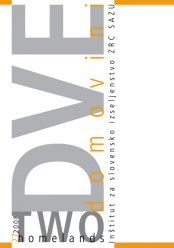Migrants with a Mandate for Nation-Building: International Agency in Multi-Ethnic Kosovo
Keywords:
nation-building, migration, UNMIK, international community, KosovoAbstract
The post-war reconstruction of Kosovo took the shape of a trusteeship-like international administration led by the United Nations Interim Mission in Kosovo (UNMIK) and partners. Large numbers of international staff were imported and entrusted with a mandate for nationbuilding according to the Western European civic-territorial model. Although this model has been perceived and promoted as an appropriate and desirable solution for multi-ethnic Kosovo, reconciliation between the ethnic communities, a prerequisite for the implementation of the proposed model, remains a serious challenge for the agents of UNMIK. A number of ambiguous and questionable solutions have been proposed, jeopardising the professional integrity of the international staff.
Downloads
References
Bliesemann de Guevara, Berit (2004). Obstacles and Perspectives of Post-Conflict Peace-Building in Multicultural Societies – a View from Peace and Conflict Studies. Perspectives of Multiculturalism: Western and Transitional Countries (ed. Milan Mesić). Zagreb: Filozofski fakultet Sveučičišta: Hrvatsko povjerenstvo za UNESCO, 67–83.
Debeljak, Aleš (2004). Evropa brez Evropejcev. Ljubljana: Sophia.
ESI (2006). Cutting the lifeline: Migration, Families and the Future of Kosovo, http://www. esiweb.org (25. 6. 2007).
Giddens, Anthony and Pierson, Christopher (1998). Conversations with Anthony Giddens: Making Sense of Modernity. Cambridge: Polity.
Green, Sarah F. (2005). Notes from the Balkans. Locating Marginality and Ambiguity on the Greek-Albanian border. Princeton, Oxford: Princeton University Press.
Iribarnegaray, Deanna (2002). Peacekeeping’s New Partnerships, http://www.peacestudiesjournal.org.uk/docs/peacekeeping.pdf (12. 1. 2008).
Južnič, Stane (1993). Identiteta. Ljubljana: FDV.
KIPRED (2005). Administration and Governance in Kosovo. Lessons learned and lessons to be learned. Prishtina: KIPRED.
KIPRED (2006). Integration of Minority Communities in the Post Status Kosovo. Prishtina: KIPRED.
KIPRED (2007). Ethnic Centralisation and the Perils of Confusing Solutions. Prishtina: KIPRED.
Kühne, Winrich (2005). Peace Operations and Governance: Lessons learned and perspec tives. Peace Operations after 11 September 2001 (ed. Thierry Tardy). London, New York: F. Cass.
Mosegaard Søysberg, Lene (2006). The Kosovo Experiment: Peacebuilding through an international trusteeship. Kosovo between War and Peace. Nationalism, Peacebuilding and International Trusteeship (eds. Tonny Brems Knudsen and Carsten Bagge Laustsen). London, New York: Routledge, 57–75.
OSCE and UNHCR (2003). Tenth Assessment of the situation of Ethnic Minorities in Kosovo, http://www.unmikonline.org/press/reports/MinorityAssessmentReport10ENG. pdf (15. 1. 2008).
OSCE (2006). Minority Language Use in Municipalities of Kosovo, http://www.osce. org/documents/mik/2006/12/22607_en.pdf (18. 1. 2008).
OSCE (2007). Parallel Structures in Kosovo 2006-2007, http://www.osce.org/documents/ mik/2007/04/23925_en.pdf (15. 1. 2008).
PISG, Institute for Spatial Planning (2004). Kosovo Profile, http://www.esiweb.org/pdf/ bridges/kosovo/8/2+.pdf (12. 3. 2008).
PISG, Office on Good Governance (2007). Report on Activities in the Areas of AntiDiscrimination, Anti-Corruption, Anti-Trafficking in Human Beings and Human Rights, No.7. Prishtina: PISG.
Smith, Anthony (1989). Ethnic Origins of Nations. Oxford, New York: B. Blackwell.
Šabec, Ksenija (2006). Homo europeus: nacionalni stereotipi in kulturna identiteta Evrope. Ljubljana: FDV.
Todorova, Maria (1997). Imagining the Balkans. New York, Oxford: Oxford University Press.
UNMIK (2001): On a Constitutional Framework for Provisional Self-Government in Kosovo, UNMIK/REG/2001/9, http://www.unmikonline.org/regulations/2001/reg09-01.htm (15. 1. 2008).
UNMIK (2000): On Self-Government of Municipalities in Kosovo, UNMIK/REG/2000/45, http://www.unmikonline.org/regulations/2000/reg45-00.htm (15.1.2008).
Downloads
Published
How to Cite
Issue
Section
License

This work is licensed under a Creative Commons Attribution-NonCommercial-NoDerivatives 4.0 International License.
Authors guarantee that the work is their own original creation and does not infringe any statutory or common-law copyright or any proprietary right of any third party. In case of claims by third parties, authors commit their self to defend the interests of the publisher, and shall cover any potential costs.
More in: Submission chapter





